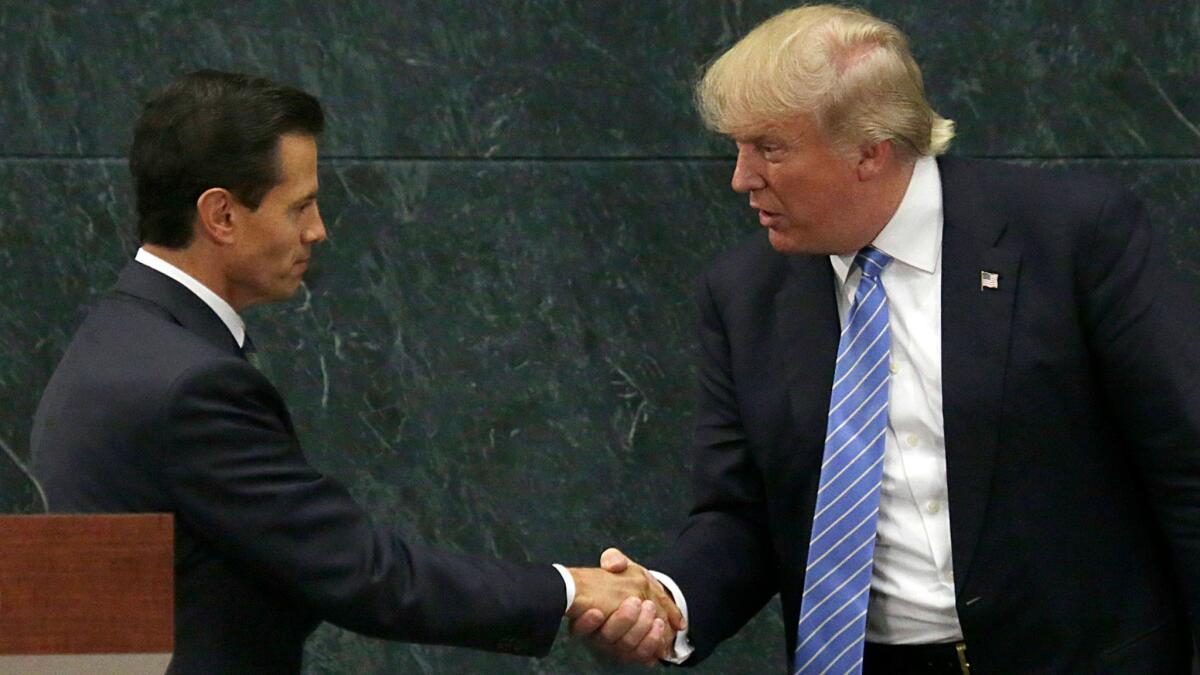Op-Ed: Mexico’s a great neighbor, but we could turn it into a bad one

Mexican President Enrique Peña Nieto was a no-show at the White House today. Late last week he scratched his scheduled visit to Washington, D.C., resigned to the fact that President Trump is in no mood to engage with any Mexico other than the one he’s created in his imagination.
Throughout his presidential campaign, Trump spun a dystopian, fictitious narrative of Mexicans and Mexico as villainous obstacles to American greatness. It took only a few days for Trump once in office to create the deepest crisis in U.S.-Mexican relations in decades, by reaffirming his intention to build a border wall (paid for by you know who), step up deportations of workers in this country illegally, and scrap the North American Free Trade Agreement. If it’s possible to breach diplomatic treaty obligations via Twitter, Trump has been busy doing so, browbeating and bullying U.S. companies investing in Mexico, and threatening to impose unilateral import tariffs.
The United States faces a number of crises and profound challenges in the world, but our relationship with Mexico, until now, has hardly been one of them. Ties with Mexico should have been listed in the incoming business-minded administration’s portfolio of impressive assets to safeguard and grow, not in the liabilities column.
A Trump-triggered economic downturn in Mexico could, perversely, increase illegal immigration into this country.
In the two decades since NAFTA went into effect, Mexico has become a more democratic, more middle class, more stable and more outward-looking country than it ever was before – much more the neighbor the U.S. always wanted. The traditional anti-Americanism that colored Mexican political discourse throughout much of the 20th century (summed up by the old saying “Poor Mexico, so far from God, so close to the U.S.”) has largely vanished.
Migration between both countries, contrary to what you hear on the nativist media outlets that created the receptive swamp for Trump’s campaign narrative, has been an asset for the North American economy. It has provided hardworking employees to American businesses, while further financing Mexico’s development in the form of cross-border remittances. Besides, emigration from Mexico peaked in 2000, and in recent years more Mexicans have left the U.S. than have arrived.
Trump is making much of the roughly $60 billion trade deficit the U.S. runs with Mexico, but let’s not lose sight of the fact that Mexico is now the second largest purchaser of American goods, to the tune of $236 billion in 2015. And unlike U.S. imports from China, nearly 40% of the components in industrial imports from Mexico are produced in the United States. This reflects the extent to which many companies have acted on the promise of NAFTA, integrating their North American supply chains to make our region more competitive as a manufacturing platform.
Under Peña Nieto, Mexico has also enacted politically sensitive reforms to its energy sector that are hugely beneficial to U.S. business and national security interests, and opened other sectors of its economy to American investment. The disdain with which all of these positive trends have been met by Trump and his supporters leaves many Mexicans feeling, as former Foreign Minister Jorge Castañeda told the New York Times last week: “Like we are Charlie Brown and they are Lucy with the football.”
It’s unfortunate that there isn’t a more outspoken pro-Mexico lobby on this side of the border to advocate for the relationship, but until now complacency has been a hallmark of American attitudes toward Mexico.
The United States is lucky to count Mexico and Canada as its neighbors, but as with most geographic realities, this strategic blessing is taken for granted. Ours is the only great continental power in history to have the luxury of not having to deploy the bulk of its military to protect its borders – despite the fact that we snatched away half of Mexican territory in a 19th century war Abraham Lincoln decried as highly immoral. Instead, almost like an island-based empire, we’ve been able to project our forces, and our strategy-shaping elites’ attention, elsewhere in the world.
The Trump administration’s actions, if unopposed, will serve only to destabilize Mexico and weaken the entire region, including the domestic economy. The peso has been plummeting in value against the dollar, which hurts Mexico’s ability to buy American goods and will widen the deficit between both countries. Growing uncertainty about North American economic integration will redirect manufacturing investment to Asia. A Trump-triggered economic downturn in Mexico could, perversely, increase illegal immigration into this country. In the long run, worst of all, Trump’s rhetorical and policy assault on such an accommodating neighbor is likely to resurrect rampant anti-American sentiment in Mexico and turn one of our stalwart allies into something entirely different – more like the Mexico of Trump’s dystopian fiction.
Sometimes alternative facts can become self-fulfilling prophecies.
Andrés Martinez is a professor of journalism at Arizona State University, a New America fellow, and the executive editor of Zócalo Public Square.
Follow the Opinion section on Twitter @latimesopinion and Facebook
Para leer esta historia en español haga clic aquí
More to Read
A cure for the common opinion
Get thought-provoking perspectives with our weekly newsletter.
You may occasionally receive promotional content from the Los Angeles Times.










